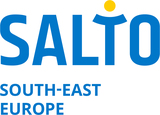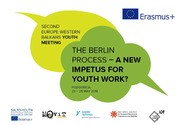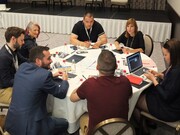2nd Europe-Western Balkans Youth Meeting 2018
The SALTO South East Europe Resource Centre in partnership with the German, Macedonian and Slovenian National Agencies and the Contact Point for Erasmus+: Youth in Action in Montenegro, ADP-Zid, organised the Second Europe-Western Balkans Youth Meeting: The Berlin process - a new impetus for youth work? in Podgorica, Montenegro, from 23 - 25 May 2018, to explore these questions.
40 youth work practitioners from Erasmus+ Programme countries and Partner Countries in the Western Balkans, recruited through an open call, discussed these questions with other stakeholders, including policy makers, representatives of European institutions and researchers. They explored the impact of recent initiatives and developments in the youth field and put together messages and recommendations to decision makers, European institutions and the youth work field, aiming to stimulate further developments in the Western Balkans and the European integration of the region.
The meeting focused on fields where youth work can play an important role:
YOUTH PARTICIPATION AND ENGAGEMENT
CIVIC/CITIZENSHIP EDUCATION (with a European dimension) and
SOCIAL INCLUSION
The programme was facilitated by two experienced facilitators, Ajša Hadzibegović and Bastian Küntzel.
A mapping exercise taking stock of inspiring projects that have been implemented in the past years in the field of youth and collecting feedback about Berlin process outcomes was carried out prior to the meeting and served as a basis for discussions.
Through an online survey, we were looking for projects involving countries in the Western Balkans that have been implemented at national, regional, European or international level since 2014, which
-
Focused on the theme of youth participation and engagement, civic/citizenship education or social inclusion
-
Can inspire others!
-
Have been successful in the sense that they have had some impact and have made a change to the environment in which they took place – e.g. on the organisations involved, the local community, policy-developments etc.
Meeting outcomes and documents
Participants' messages (includes programme overview and list of participants)
The concluding panel session where participants voiced their messages to decision makers and other youth workers was live-streamed. The video is available on our Facebook page
Rethinking Regional Youth Work within the Context of the Berlin Process article by Mary Drosopoulos
Youth policies in the Western Balkans study by Sladjana Petković
Working document: Outcomes of reflections in thematic working groups
Impact of the Berlin process - Inspiring youth projects, challenges and achievements outcomes of a survey conducted by Lana Pašić
Survey annex: Project summaries
Political context
The »Berlin process«, initiated in 2014 in Berlin, aims to step up the process of European integration of the Western Balkan region. The youth events accompanying the annual summits of heads of state and government in Paris, 2016, and Trieste, 2017, concluded with recommendations for further developments the youth field; in addition, an Action Plan for youth work and youth policy was defined at the first Europe-Western Balkans Youth Meeting in Ljubljana in 2016.
Increasing support for regional cooperation between the countries of the Western Balkan region aiming to support reconciliation was one important recommendation, and the establishment of the Regional Youth Coordination Office for the Western Balkans (RYCO) today represents the most visible result of the Berlin process in the field of youth. At the same time, over 2.500 European cooperation projects involving over 15.000 participants from the Western Balkans and a variety of countries across Europe have been implemented in the field of youth with the support of the Erasmus+ programme since 2014 supporting the exchange of practices, the building of competences and capacities, intercultural understanding and long-lasting partnerships.
The next summit of heads of state and government within the Berlin process is scheduled to take place in London on 9 – 10 July 2018. The European integration process of the Western Balkan region has received an additional impetus with the announcement by the European Commission, on 6 February 2018, of A new Strategy for the Western Balkans. Two flagship initiatives that include enhanced support for European and regional cooperation with specific reference to the role of Erasmus+ and RYCO in stepping up the process of reconciliation and the social and economic development of the region have been reconfirmed by the Sofia Declaration of the EU - Western Balkans summit on 17th May.
Further important developments in the youth field at European level, which can be expected to have an influence on possibilities for cooperation with and developments in the region include the development of the new EU youth strategy as well as a new generation of European youth programmes following the end of the current Erasmus+ programme in 2020.
Downloads
The following downloads are available:




